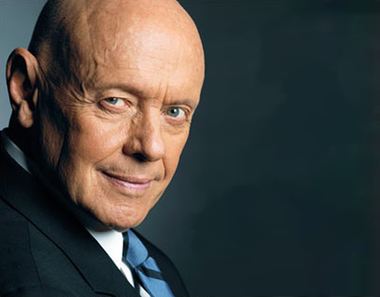That man is Stephen Covey. I first came across his most famous work, The 7 Habits of Highly Effective People, when I was researching my first book and was still struggling to succeed as a driven twenty-something in a complex business world. Several years later, I would be thrilled to collaborate with Stephen on an article for the Wall Street Journal and a webinar I produced on career change. He graciously wrote the forward for my third book, New Job, New You, and we then co-hosted two events to bring Stephen’s most important ideas to a new generation of professionals. Throughout our relationship, I was in awe of Stephen’s wisdom and very grateful that he was willing to serve as a mentor to me. Stephen was turning 80 this year and I hoped he would have many years left to contribute plentifully to the field he pioneered decades ago. But unfortunately, it was not meant to be. As I remember him today, I thought I’d call out some of his lifehacks that resonated most with me:
Draw your big picture with a personal mission statement
Too often, we drift through our lives like sailboats – meandering aimlessly from one thing to another. This is how I operated for my first few years out of college – until Stephen came into my life. He taught me to be purposeful about my life and work and to think hard about what I wanted to be (character), what I wanted to do (contributions), and the values I held dear. I have adjusted my personal mission statement over the years, but I’ve never forgotten about it. It’s my compass, and it reminds me where I’m going during bad days and setbacks.
Act rather than be acted upon
We are responsible for making things happen in our lives. If you wait around until the economy gets better or your kids are grown up to pursue your dream career, you may never get there. I used to complain that circumstances were preventing me from my goals, until Stephen showed me that I would be more successful if I focused on generating solutions rather than calling out problems. And to this day, I try never to get stuck in what Dr. Seuss calls “the waiting place.”
Get people to cooperate through win/win
People don’t care what you need to do – they want to know what’s in it for them. When you don’t have direct authority over people, think about what would make them want to do what you’re asking. By devising a win/win proposition, you get what you need and the other person gets what she needs. Everyone benefits and feels good about the interaction.
Revitalize your life and work by sharpening the saw
Stephen’s concept of taking time for self-renewal in times of stress and change is of particular importance today when the business world is tougher than ever. When you work so hard that you burn out, you’re not helping anyone. Thanks to Stephen’s influence, I have tried to lead a balanced life, carving out time for my physical, mental, social/emotional, and spiritual pursuits so that I bring my most authentic and effective self to my work. Thank you Stephen Covey for the difference you’ve already made and will continue to make in millions of lives. You will be missed. (Photo credit: Thinkers50.com)
